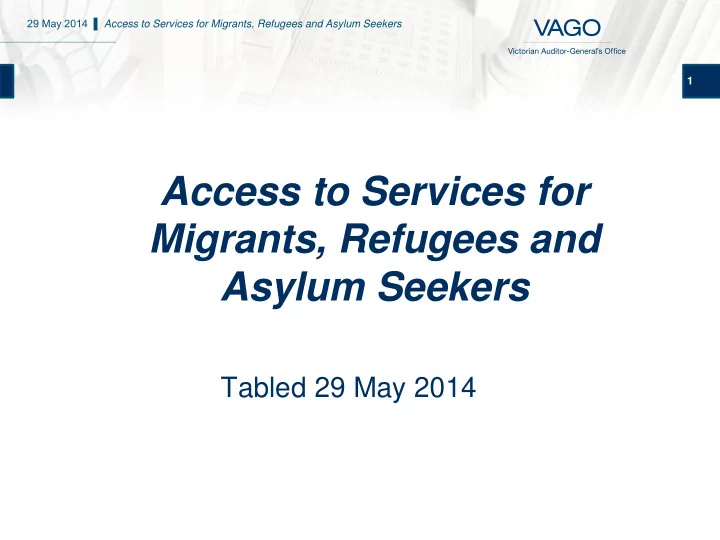

29 May 2014 ▌ Access to Services for Migrants, Refugees and Asylum Seekers 1 Access to Services for Migrants, Refugees and Asylum Seekers Tabled 29 May 2014
29 May 2014 ▌ Access to Services for Migrants, Refugees and Asylum Seekers Background 2 page • Victoria is one the most 1 culturally diverse communities in the world. • Around 26 per cent of Victoria’s population was born overseas. • Victoria accounts for around 30 per cent of migrant settlement in Australia. • The demographic profile of new arrivals to Victoria has changed significantly in recent years. Photo courtesy of Office of Multicultural Affairs and Citizenship (OMAC).
29 May 2014 ▌ Access to Services for Migrants, Refugees and Asylum Seekers Audit objective and scope 3 page To assess the accessibility of government services for migrants, 8 refugees and asylum seekers. We looked at whether: • departments understand the needs of these groups • departments have in place strategies and actions to support access • departments can show if their strategies and actions are effective • whole-of-government approaches are leading to informed and coordinated services. Photo courtesy of OMAC.
29 May 2014 ▌ Access to Services for Migrants, Refugees and Asylum Seekers Audit objective and scope – continued 4 page The audit included five different departments and agencies: 8 • Department of Health (DH) • Department of Human Services (DHS) • Department of Education and Early Childhood Development (DEECD) • Office of Multicultural Affairs and Citizenship (OMAC) • Victorian Multicultural Commission (VMC). We looked at a broad range of services with a particular focus on three: • DEECD’s Maternal and Child Health service—universal and free • DH’s Refugee Health Nurse Program—targeted service • DHS’ family violence services—universal and acts as a referral pathway to other services.
29 May 2014 ▌ Access to Services for Migrants, Refugees and Asylum Seekers Conclusions 5 • Departments could be doing more to understand client need and whether it is being met. • Departments are not being held sufficiently to account for their performance in multicultural affairs. • Whole-of-government structures and processes are not resulting in informed and coordinated service delivery.
29 May 2014 ▌ Access to Services for Migrants, Refugees and Asylum Seekers Findings – understanding of client need 6 page • Departments do not 12 always recognise the particular needs of migrants, refugees and asylum seekers in strategic frameworks. • Departmental understanding of barriers to and enablers of access is not underpinned by systematic data analysis. Photo by Jorge De Araujo. By permission of the Victorian Multicultural Commission.
29 May 2014 ▌ Access to Services for Migrants, Refugees and Asylum Seekers Findings – departmental strategies and activities 7 pages • Stakeholder consultations 14–18 are not coordinated within or across departments. • Cultural competency training and reporting requirements for departments and service providers are not clear. • Not all departments have current and comprehensive cultural diversity plans. Photo courtesy of bikeriderlondon/Shutterstock.com
29 May 2014 ▌ Access to Services for Migrants, Refugees and Asylum Seekers Findings – monitoring and reporting 8 • Data limitations affect page 25 service planning. • Departments report on their activities but not page 24 whether their activities have been effective. • Departments need to page 14 more systematically collect and analyse data. Photo by Jorge De Araujo. By permission of the Victorian Multicultural Commission.
29 May 2014 ▌ Access to Services for Migrants, Refugees and Asylum Seekers Findings – whole-of-government 9 pages There is: 34 & 39 • no body with oversight of departmental performance • limited cross-departmental collaboration • no statewide mapping of services to identify gaps or reduce duplication • no whole-of-government monitoring and reporting of expenditure to be able to tell if funding is appropriately allocated and leading to improvement. Photo by Jorge De Araujo. By permission of the Victorian Multicultural Commission.
29 May 2014 ▌ Access to Services for Migrants, Refugees and Asylum Seekers Findings – whole-of-government – continued 10 pages There is lack of role clarity for 36–37 two key bodies tasked with whole-of-government responsibilities: • OMAC leads policy development and implementation, but lacks authority to require departmental compliance. • VMC is an independent advisory body whose role is unclear and whose expertise is not being used by departments. Photo by Jorge De Araujo. By permission of the Victorian Multicultural Commission.
29 May 2014 ▌ Access to Services for Migrants, Refugees and Asylum Seekers Recommendations 11 Accept That DH, DHS and DEECD: develop and report annually on their cultural diversity plans 1. —or equivalent—in consultation with OMAC and VMC include in their reporting of progress on cultural diversity 2. plans explicit reference to: • how culturally appropriate training for staff has been incorporated into the delivery of services for culturally and linguistically diverse communities • how information has been used to increase accessibility of services for culturally and linguistically diverse communities • the effectiveness of service delivery to culturally and linguistically diverse communities as an integral part of program evaluation.
29 May 2014 ▌ Access to Services for Migrants, Refugees and Asylum Seekers Recommendations – continued 12 Accept 3. That OMAC within the Department of Premier and Cabinet monitors and reports on departmental compliance with the reporting requirements of s.26 Multicultural Victoria Act 2011 . That the Department of Premier and Cabinet: 4. defines more clearly the roles and responsibilities of OMAC and VMC 5. develops appropriate governance arrangements for OMAC and VMC with robust and effective reporting and accountability mechanisms 6. That VMC and OMAC work closely together to monitor and report on overall departmental performance in relation to the provision of accessible, responsive and effective services.
29 May 2014 ▌ Access to Services for Migrants, Refugees and Asylum Seekers Contact details 13 For further information on this presentation please contact: Victorian Auditor-General’s Office [p] 8601 7000 [w] www.audit.vic.gov.au/about_us/contact_us.aspx
Recommend
More recommend